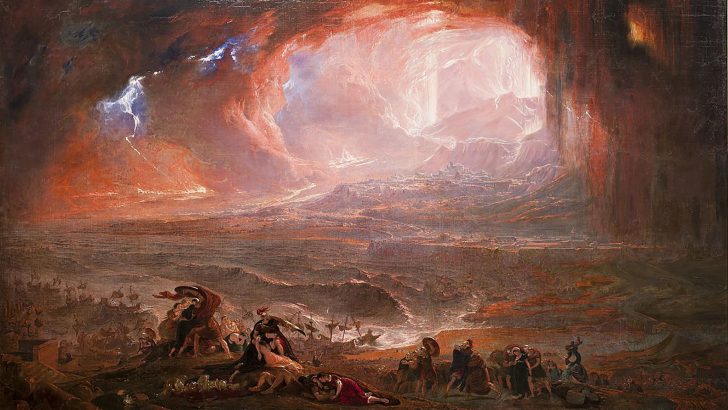In the Shadow of Vesuvius: a Life of Pliny
by Daisy Dunn (William Collins, £9.00 / €11.90)
The Natural History
by Pliny the Elder, translated with an introduction by John Healey (Penguin Classics, €15.99 / £9.99)
The Letters of the Younger Pliny
translated by Betty Radice (Penguin Classics, £9.99 / €9.42)
A life of Pliny? Yes please, I said, when I saw this book announced. Being under the impression, not having seen the book, that the “Pliny” referred to was that very important figure Pliny the Elder.
Latin literature
But no: the book is about his nephew, his adopted son and heir, Pliny the Younger. A young man of purely literary ambition he began to write and to retain a series of letters to his friends, which on publication became a landmark of Latin literature. The most famous is one describing in vivid detail how the Elder Pliny died while involved in sea operations during the famous eruption of Vesuvius that buried Pompeii and Herculaneum in 79 AD.
I am one of those who regard the older man – only 56 when he died – as a more important figure for human culture that the younger one.
Pliny the Elder was a creator of the Historia Naturalis, a ‘Natural History of the World’, an encyclopaedia running to some 37 books of what was known about the natural world, which now lights up all kinds of dark corners of the past, including for instance the invention of blown glass.
But readers might wonder how does this antiquated and surely long out dated literary work affect our lives? It is often forgotten that the great part of what was written by the Greeks and Romans is simply lost to us today. Pliny the Elder, for instance, who went nowhere without a slave to take his dictation, composed 160 volumes of notes and comments on the books which formed his extensive sources. These rolls passed to Pliny the Younger, but today are quite lost. We know a great deal about classical times, but much, much less than we imagine.
Pliny the Elder is one of those giants of the past upon whose shoulders the lesser figures of today perch precariously”
Pliny is therefore an immense asset, even if (as is the way of academics) modern academia disputes what he wrote. His brief passage on the Essenes is a vital and much respected source, in all the discussion of the community of Qumran and the nature of the Dead Sea Scrolls. All of this relates directly to the social and religious background from which Christianity eventually emerged. So Pliny is a relevant source for early Church history that few are aware of unless they are specialists.
I know that in my own case I cannot begin a project with any classical or medieval content without looking to see what Pliny the Elder has to say that bears upon it. Of course, in recent centuries modern scientists and historians have impugned his accuracy, but as he is often the only source for things we know this is hardly fair. Pliny the Elder is one of those giants of the past upon whose shoulders the lesser figures of today perch precariously.
Classical culture
Daisy Dunn’s book, focused as it is on two extraordinary characters, provides an excellent entry route to exploring classical culture for those who would like to learn more but fear the task may be beyond them. This book is an excellent route, more accessible than and not as forbidding as say Mary Beard’s formidable SPQR (Profile, £10.99pb). Certainly more reliable than Tom Holland’s brisk tours of the past. For many Daisy Dunn may be the beginning of something really exciting.
Pliny the Young is an important figure in the history of Roman Literature. He is an artist in prose, and his work, involving as it does the revelation of an indivudal’s character, is very much to the modern taste.
Alas this pious simplicity of the first century had disappeared by the time of Constantine, and Chrstians, alas, were happy in their turn having taken power, to persecute their opponents”
But Pliny the Elder, with his dedicated daily search for knowledge as a constant factor in his life, is the essential scientist, the kind of man to whom the world owes far more than it sometimes cares to acknowledge.
From Pliny the Younger we hear also about the early Christians. When Trajan became emperor in 98 AD, Pliny the Younger was made consul, and soon after civil governor of Pontus and Bithynia on the Black Sea coast of Asia Minor (modern Turkey).
There he ended the persecution of the Christians in the province: he told Trajan back in Rome that “the Christians were a meek and inoffensive sect of men, their morals pure and innocent, they were free from all crimes, and the voluntarily bound themselves by the most solemn oaths to abstain from vice, and relinquish every sinful pursuit”.
Alas this pious simplicity of the first century had disappeared by the time of Constantine, and Christians, alas, were happy in their turn having taken power, to persecute their opponents.


 Peter Costello
Peter Costello Destruction of Pompeii and
Herculaneum in 79 AD.
Destruction of Pompeii and
Herculaneum in 79 AD. 